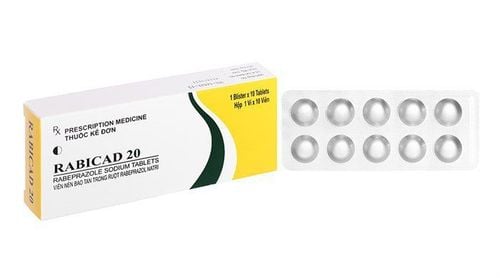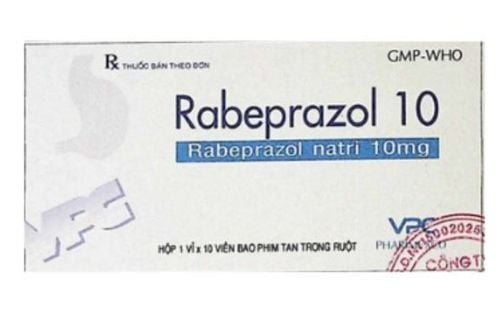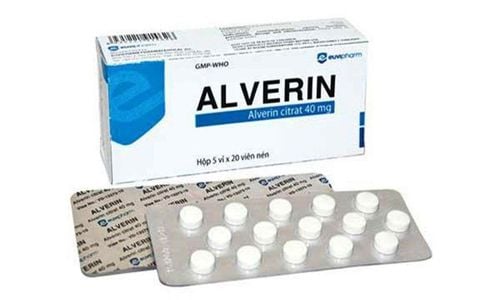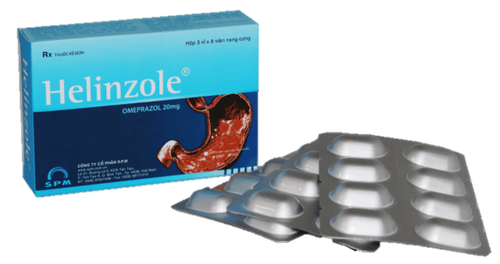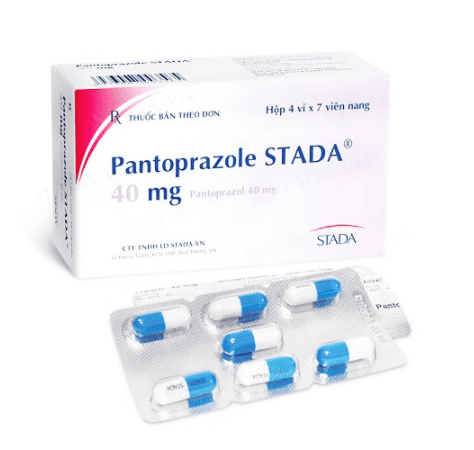This is an automatically translated article.
Rabsun contains the main active ingredient Rabeprazole with a concentration of 20mg / 10ml. Rabsun helps to actively treat peptic ulcer disease, gastroesophageal reflux disease and Zollinger - Ellison syndrome.
1. What are the effects of Rabsun?
Rabsun contains the main active ingredient, Rabeprazole, which belongs to the class of anti-secretory drugs, which blocks gastric acid secretion by inhibiting the H+/K+ ATPase pump at the secretory surface of gastric parietal cells. Rabsun is used to treat certain problems in the stomach and esophagus (such as acid reflux, ulcers). The drug works to reduce the amount of acid in the stomach, reducing symptoms such as heartburn, difficulty swallowing and persistent cough. In addition, Rabsun also has the effect of healing acid damage in the stomach and esophagus, helping to prevent ulcers or esophageal cancer.2. Indications of the drug Rabsun
Indications to use Rabsun in the following cases:
Acute duodenal ulcer; Acute gastric ulcer; Gastroesophageal reflux disease (GERD) with symptoms; Patients with high gastrointestinal bleeding without esophageal varices; Zollinger - Ellison syndrome ; Patients with duodenal ulcer with Helicobacter pylori infection (In combination with an appropriate course of antibiotics).
3. Contraindications to taking Rabsun
Do not use Rabsun in the following cases:
The patient has a history of allergy or hypersensitivity to the drug's ingredients; Patients with a history of allergy to Benzimidazole derivatives (eg, Ezomeprazole, Lanzoprazole, Omeprazole, Pantoprazole).
4. Dosage and how to use Rabsun
4.1. Dosage of the drug Rabsun Acute duodenal ulcer: Dose 20mg/day x 1 time/day in the morning, treatment lasts for 4 weeks if the ulcer is not completely healed. Benign acute gastric ulcer: Dose 20mg/day x 1 time/day in the morning, treatment lasts for 6 weeks. If the ulcer is not completely healed then continue treatment for another 6 weeks. Gastroesophageal reflux syndrome - oesophagitis with ulcer or scratch symptoms: Dose 20mg / time x 1 time / day, lasting for 4 - 8 weeks. Gastroesophageal reflux disease requires long-term treatment: For maintenance treatment, the daily dose is from 10 to 20 mg/time x 1 time/day, the dose depends on the patient's response. Symptomatic treatment of gastroesophageal reflux disease - non-esophagitis: 10mg/time x 1 time/day, lasting up to 4 weeks, then 10mg/time/day when symptoms appear. Zollinger - Ellison syndrome: The starting dose is 60mg/time x 1 time/day, the maximum dose can be increased up to 120mg/day, divided into 2 times depending on the condition and disease status of each patient. Treatment lasts until the end of clinical symptoms. H. pylori-positive benign gastric ulcer and/or duodenal ulcer: It is recommended to combine the following drugs within 7 days: Rabsun 20mg/time x 2 times/day + Clarithromycin 500mg/time x 2 times/ and Amoxicillin 1g/time x 2 times/day. Children:
Treatment of symptomatic GERD in adolescent patients 12 years of age and older: 20 mg/time x 1 time/day for up to 8 weeks. Other subjects:
Patients with liver and kidney failure: No dose adjustment of Rabsun is required. 4.2. How to use the drug Rabsun Rabsun is prepared in powder form for injection, so patients use the drug by injection. Patients should not self-inject at home, but need to use the drug under the supervision of medical staff. In the process of using the drug, the patient needs to follow the doctor's instructions, do not arbitrarily adjust the dose of the drug to achieve his own desires.
5. Undesirable effects of the drug Rabsun
Common adverse effects:
Systemic: Asthenia, fever, allergic reactions, chills, malaise, photosensitivity reactions. Cardiovascular system: Hypertension, ECG abnormalities, syncope, angina, palpitations, bradycardia or sinus tachycardia. Digestive system: Diarrhea, nausea, abdominal pain, vomiting, anorexia, mouth ulcers, stomatitis, dysphagia, gingivitis, glossitis, dyspepsia, flatulence, constipation, dry mouth, belching, inflammation gastrointestinal bleeding, rectal bleeding, melena, cholecystitis, increased appetite, colitis, esophagitis, pancreatitis, proctitis. Endocrine system: Hyperthyroidism, hypothyroidism. Blood and lymphatic system: Anemia, bleeding ecchymosis on the skin, lymphadenopathy. Metabolic disorders: Peripheral edema, weight gain, or weight loss. Musculoskeletal system: Muscle pain, arthritis, joint disease, bursitis, stiff neck, stiff neck. Nervous system: Insomnia, anxiety, dizziness, weakness, nervousness, somnolence, neuropathy, paresthesia, tremor, hypertonia, dizziness, convulsions, decreased libido. Respiratory system: Nosebleeds, laryngitis, dyspnea, hyperventilation, asthma. On the skin: Rash, itching, sweating, urticaria, hair loss. Five senses: Cataracts, decreased vision, glaucoma, dry eyes, abnormal vision, tinnitus, otitis media. Genitourinary system: Cystitis, urinary incontinence, dysuria or polyuria, dysmenorrhea, uterine bleeding. Blood tests: Abnormal platelets, red blood cells, white blood cells, albuminuria, increased creatinine phosphokinase, hypercholesterolemia, hyperglycemia, hypokalemia, hyponatremia, liver function tests abnormal, abnormal urine. Uncommon side effects
Nervous system: Restlessness, drowsiness. Digestive system: Indigestion, dry mouth, belching. On the skin: Itching, erythema. Musculoskeletal system: Muscle pain, cramps, arthralgia. Urinary system: Urinary tract infections, increased liver enzymes. Rare adverse effects:
Blood tests: neutropenia, leukopenia, thrombocytopenia, leukocytosis. Nervous system: Depression, visual disturbances. Digestive system: Gastritis, gingivitis, taste disturbances, hepatitis, jaundice, hepatic encephalopathy. On the skin: pruritus, blistering reaction. Urinary system: Interstitial nephritis.
6. Be careful when using Rabsun
When using Rabsun, the patient should note the following information:
It is necessary to exclude the possibility that the patient has gastrointestinal malignancies before treatment with Rabsun because it may mask the disease symptoms. Rabsun treatment lasts more than 1 year, patients need to be monitored periodically for health status. Rabsun should be used with caution because it may cause cross-hypersensitivity with other proton pump inhibitors or benzimidazole derivatives when used instead. Do not use Rabsun in children because there have been no studies using the drug in children and the drug can cause side effects on the blood-forming organs such as thrombocytopenia and neutropenia. However, in most cases, the cause of this condition is not found, these blood disorders are not serious and will go away when Rabsun is stopped. Rabsun may cause an increase in liver enzymes during use, so it should be used with caution in people with severe liver impairment. Treatment with proton pump inhibitors, including Rabsun, may increase the risk of gastrointestinal infections with strains such as Salmonella, Campylobacter and Clostridium difficile. Gastrointestinal diseases and pseudomembranous colitis should be excluded when using Rabsun. Note to pregnant women: There are currently no studies showing that the drug is well controlled and appropriate for pregnant women. Therefore, this drug should only be used if prescribed by a doctor when the benefits outweigh the risk factors. Note to Lactation: Because the drug is excreted in human milk and because of the potential for adverse effects in the nursing infant from Rabsun, a nursing mother should therefore decide whether to discontinue the drug or discontinue the drug. breast-feeding while taking the drug. Note when driving and operating machines: Due to the possible drowsiness side effects of Rabsun affecting the patient's alertness, it is recommended that when using Rabsun, do not drive or operate machinery or do other activities. The job requires alertness.
7. Interactions of Rabsun
When using Rabsun, the following drug interactions should be noted:
Ketoconazole antifungal. Cardiovascular drug Digoxin. Clopidogrel antiplatelet drug. HIV medicine: Rilpivirine. Patients should minimize food or drink containing alcohol or stimulants while using Rabsun. Rabsun may decrease the concentration/effect of Atazanavir, Clopidogrel, Dabigatran, Etexilate, Dasatinib, Erlotinib, Indinavir, iron salts, Itraconazole, Ketoconazole, Mesalamin, Mycophenolate, Nelfinavir Rabsun may increase the concentration/effect of drugs that are: substrates CYP2C19, CYP2C8 (high risk), Methotrexate, Saquinavir, Voriconazole. Before using the drug, the patient needs to fully list the treatment drugs and support pills that he is using so that the doctor and pharmacist know the correct information and advice to avoid drug interactions. beneficial to the patient.
Above is all information about Rabsun, patients need to carefully read the instructions for use, consult a doctor / pharmacist before using. Note, Rabsun is a prescription drug, patients need to use the drug as prescribed by the doctor, absolutely do not self-treat at home.




